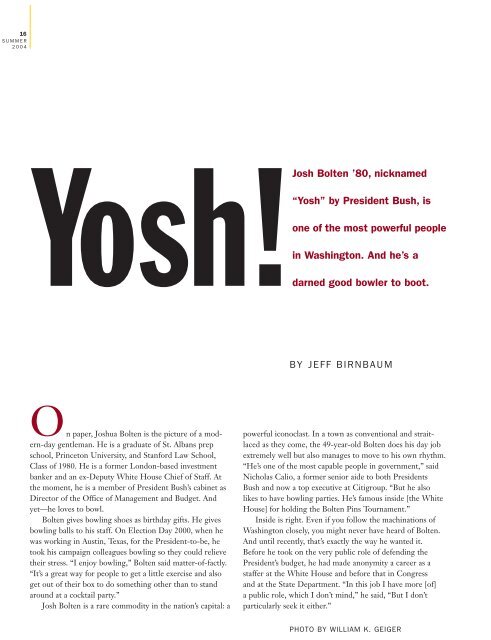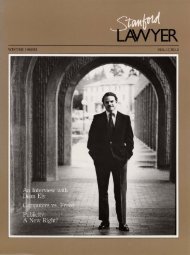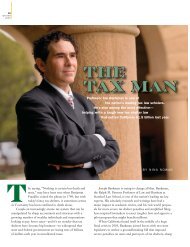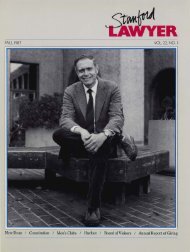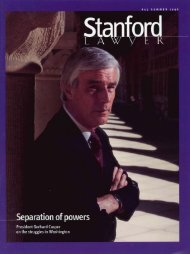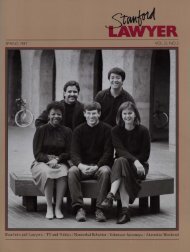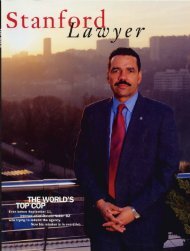Josh Bolten '80, nicknamed “Yosh” by President ... - Stanford Lawyer
Josh Bolten '80, nicknamed “Yosh” by President ... - Stanford Lawyer
Josh Bolten '80, nicknamed “Yosh” by President ... - Stanford Lawyer
- No tags were found...
You also want an ePaper? Increase the reach of your titles
YUMPU automatically turns print PDFs into web optimized ePapers that Google loves.
16SUMMER2004Yosh!<strong>Josh</strong> <strong>Bolten</strong> ’80, <strong>nicknamed</strong><strong>“Yosh”</strong> <strong>by</strong> <strong>President</strong> Bush, isone of the most powerful peoplein Washington. And he’s adarned good bowler to boot.BY JEFF BIRNBAUMOn paper, <strong>Josh</strong>ua <strong>Bolten</strong> is the picture of a modern-daygentleman. He is a graduate of St. Albans prepschool, Princeton University, and <strong>Stanford</strong> Law School,Class of 1980. He is a former London-based investmentbanker and an ex-Deputy White House Chief of Staff. Atthe moment, he is a member of <strong>President</strong> Bush’s cabinet asDirector of the Office of Management and Budget. Andyet—he loves to bowl.<strong>Bolten</strong> gives bowling shoes as birthday gifts. He givesbowling balls to his staff. On Election Day 2000, when hewas working in Austin, Texas, for the <strong>President</strong>-to-be, hetook his campaign colleagues bowling so they could relievetheir stress. “I enjoy bowling,” <strong>Bolten</strong> said matter-of-factly.“It’s a great way for people to get a little exercise and alsoget out of their box to do something other than to standaround at a cocktail party.”<strong>Josh</strong> <strong>Bolten</strong> is a rare commodity in the nation’s capital: apowerful iconoclast. In a town as conventional and straitlacedas they come, the 49-year-old <strong>Bolten</strong> does his day jobextremely well but also manages to move to his own rhythm.“He’s one of the most capable people in government,” saidNicholas Calio, a former senior aide to both <strong>President</strong>sBush and now a top executive at Citigroup. “But he alsolikes to have bowling parties. He’s famous inside [the WhiteHouse] for holding the <strong>Bolten</strong> Pins Tournament.”Inside is right. Even if you follow the machinations ofWashington closely, you might never have heard of <strong>Bolten</strong>.And until recently, that’s exactly the way he wanted it.Before he took on the very public role of defending the<strong>President</strong>’s budget, he had made anonymity a career as astaffer at the White House and before that in Congressand at the State Department. “In this job I have more [of]a public role, which I don’t mind,” he said, “But I don’tparticularly seek it either.”PHOTO BY WILLIAM K. GEIGER
18SUMMER2004JOSH BOLTENAt the same time, <strong>Bolten</strong>’s drive to achieve is as high ashis profile is low. Even in bowling. For a while he held thisadministration’s record score for bowling at Camp David,the presidential retreat in Maryland’s Catoctin Mountainsoutside Washington—207 out of a perfect 300. He reachedthat height in a game against <strong>President</strong> Bush. Usually, it’snot good form to beat the Leader of the Free World—atanything. “But it’s a much worse thing to ease up when competingwith him,” <strong>Bolten</strong> said. “If he senses that you’re easingup because he’s <strong>President</strong>, he really gets annoyed. You’vegot to do your best.”<strong>Bolten</strong> should know. For the last 15 years, the man whomGeorge W. Bush has <strong>nicknamed</strong> <strong>“Yosh”</strong> has spent mostof his waking hours working for presidents named Bush.During the administration of the first <strong>President</strong> GeorgeBush, <strong>Bolten</strong> served for three years as General Counsel tothe U.S. Trade Representative and one year as a WhiteHouse lob<strong>by</strong>ist—a.k.a. Deputy Assistant to the <strong>President</strong> forLegislative Affairs. He spent two years as Policy Director ofGeorge W. Bush’s campaign for president before joining theadministration, where he’s had two jobs. Initially, <strong>Bolten</strong> wasDeputy Chief of Staff for Policy and since June 2003 he’sbeen OMB Director. For the five years in between—1994 to1999—Goldman Sachs International in London employedhim as Executive Director, Legal & Government Affairs.With experience like that, <strong>Bolten</strong> could work almostanywhere. But it turns out that the job he has is the one hereally wants. The allure of government service has alwaysbeen too much for him to refuse. When the current<strong>President</strong> George Bush, then the Governor of Texas, wasputting together his election team in 1999, <strong>Bolten</strong> was comfortableand happy in England. But Robert Zoellick, nowthe U.S. Trade Representative, recommended <strong>Bolten</strong> to leadthe team of experts that would devise Bush’s policy proposalsfor the 2000 campaign, and <strong>Bolten</strong> jumped at the chance.Not that he adores campaigns. Elections aren’t really hisforte. What he really likes is to wrestle with difficult questionsof policy and to make a big enterprise—indeed, theworld’s largest enterprise, the U.S. government—work well.So he packed up his flat in London, flew to Austin, and setup a new home. In his typically hyper-organized way, hegave himself eight hours to find a place to live and fourhours to buy some wheels. He chose a used white 1994Ford Ranger pickup truck, which he still drives today.Now, sitting in the high-ceilinged office that oncehoused the office of the Secretary of War, <strong>Bolten</strong> is clearly acontented man. “I like it a lot,” he said with a broad smile.“If you’re a student of government, which I have become,there are few if any better places to be than OMB.”His co-workers at the White House are also thrilled tohave him. “First of all, he’s really smart, he’s very humble,and he has a great sense of humor,” White House Chief ofStaff Andrew Card said in an interview. “He’s like a spongeabsorbing everything that everybody else says. He’s notquick to respond but he generally responds with tremendouswisdom.”“He’s soft-spoken but very clear thinking,” said KarlRove, Bush’s chief political adviser. “I love him in an entirelyappropriate way. He’s a wonderful person. He’s professionallyand personally one of the best people I’ve ever workedwith.”Bush has relied on <strong>Bolten</strong> to take on some of the WhiteHouse’s most difficult roles. As Card’s deputy, <strong>Bolten</strong> had toreferee differences between cabinet officers and other officialson policies as wide-ranging as tax cuts and energy. Andnow, as OMB Director, he has to enforce the often-toughfiscal decisions that the <strong>President</strong> makes. “That is the mostthankless job in the world,” said Rove. “Yet the people hedeals with tend to understand. They feel well treated <strong>by</strong> himeven if they’ve lost their appeal.”The Office of Management and Budget, <strong>Bolten</strong> explained,“is at the fulcrum of government.” Nothing movesin the $2.3 trillion federal government without one of OMB’snearly 500 analysts looking it over and giving his or herview. All of the <strong>President</strong>’s policy proposals are also screenedand often refined at OMB, and most policy pronouncements<strong>by</strong> members of the <strong>President</strong>’s cabinet are reviewed therebefore uttered publicly.“Anybody in the Bush administration who has to testifyon Capitol Hill, their testimony has to come through OMB,”said <strong>Bolten</strong>. “It’s our function to make sure that it’s consistentwith the <strong>President</strong>’s policies. It’s a crucial role. You can’thave the Interior Department saying something differentfrom [the] Environmental Protection Agency.”During this time of supersized budget deficits, OMBoften plays the “bad cop” of the administration. It’s the jobof OMB, and <strong>Bolten</strong> in particular, to tell agency heads andsenior lawmakers that the pet programs they say the countrysimply can’t do without are just too expensive to take on. Inother words, <strong>Bolten</strong>’s main job is, more often than not, tojust say “no.”Now that he’s at OMB, <strong>Bolten</strong> doesn’t see Bush as oftenas he used to when he was Deputy Chief of Staff. Back thenhis office was two doors down from the Oval Office in theWest Wing and he met with Bush nearly every day. Now hisoffice is in the Old Executive Office Building next door andhe sees the <strong>President</strong> once or twice a week. But he has farJeff Birnbaum is a writer and columnist at the Washington Post,and appears regularly on PBS’s Washington Week and the FoxNews Channel.
JOSH BOLTEN 19STANFORDLAWYERgreater contact with the other top officials in the Bushadministration. Because of OMB’s important coordinatingrole for the entire government, “I probably speak with oneor another of my cabinet colleagues almost every day,” said<strong>Bolten</strong>. “When the budget is in the throes of being assembled,probably several times a day. That’s why I think thisagency is at the fulcrum of government. I have to interactwith almost every other part of government.”If that sounds like a mammoth job, it is. And only aworkaholic like <strong>Bolten</strong> would even consider taking it on.“My days are long,” <strong>Bolten</strong> admitted. “I get here at 7:30a.m. for the White House senior staff meeting and I’mrarely out of here before 10:30 at night.” His only complaintis that he wishes he didn’t have to show up asearly as he does. “I don’t like the 7:30 part,”he said. “I’m not a morning person.” Still, heclearly relishes the long hours. “Every daywhen I come through the gates, I feel privilegedto work here. Even when I stay until10:30, 11:00, or 11:30 at night, I’m often tiredbut very rarely dispirited or discouraged. Ialmost never have that feeling that I don’twant to come back anytime soon.”Part of <strong>Bolten</strong>’s enthusiasm comes fromhis sincere affection for Bush. “I think the<strong>President</strong> is a terrific leader and a great guy,”he said. But he is also well aware that a job inthe White House, especially these days, ismore than a cult of personality. <strong>Bolten</strong> knowsthat his work has far-reaching consequences,which gives him an even greater sense of purpose.“Because of the times we’re in, whatgoes on here isn’t trivial,” said <strong>Bolten</strong>. “Inthe midst of the war on terrorism, these areimportant times.”Almost immediately after the horrificattacks of September 11, 2001, <strong>Bolten</strong> washanded a key resposibility. The White House’s NationalSecurity Council, headed <strong>by</strong> former <strong>Stanford</strong> ProvostCondoleezza Rice, was so overwhelmed with its antiterrorismduties that the <strong>President</strong> decided to hand off someof its tasks to an ad hoc organization called the DomesticConsequences Principals Group. He placed <strong>Bolten</strong> incharge. Starting a couple days after September 11, <strong>Bolten</strong>began to convene a daily meeting of cabinet officers wholooked at ways to enhance protection of Americans in thiscountry, an enterprise now known as homeland security.“Andy Card and Condi Rice came to me and said,‘There’s too much to do. Could you take away from theNSC the issues that aren’t immediately essential [to] thePHOTO: DOUG MILLS, THE NEW YORK TIMESnational security apparatus?’ And I said, ‘Sure.’”At the core of <strong>Bolten</strong>’s group were the Secretaries ofTreasury, Transportation, Health, and Energy with regularappearances from other senior officials at agencies like EPAand Interior. The group reviewed the USA Patriot Act,which bolstered the government’s domestic law enforcementpowers after 9/11. It also set in motion plans to protectAmericans from further attacks, including those from biologicalweapons, and decided when and how to open airspace to commercial travel again. Still, <strong>Bolten</strong> said, “Itwasn’t a really good way to have government decision making.”So as soon as he could, he phased the group out andreturned to business as usual as Deputy Chief of Staff.<strong>Josh</strong> <strong>Bolten</strong> answers a question posed during a July 2003 budget review, just two months afterbeing appointed Director of the Office of Management and Budget. <strong>Bolten</strong> has the difficultassignment of helping corral the large federal deficit.<strong>Bolten</strong> had about a year of what passes for “normal” inWashington, and then the <strong>President</strong> called on him again.“One day in the spring of last year, the <strong>President</strong> was havinga sandwich for lunch in his side dining room off the OvalOffice, and I had to be in there to talk to him about something,”<strong>Bolten</strong> recalled. “He mentioned that Mitch Danielswould almost certainly be leaving as OMB Director to runfor Governor of Indiana. He asked who I thought would bebest suited for the job. I had some people in mind, whom Imentioned.”Bush inquired closely about <strong>Bolten</strong>’s suggestions andthen asked a surprise question: “How about you?”<strong>Bolten</strong> says that taking the OMB job had never occurred
20SUMMER2004JOSH BOLTENto him and his reaction was loud and visceral. “Nooooo!” hesaid. At least at first blush, <strong>Bolten</strong> thought he was the wrongperson for the job and said so.“Why?” the <strong>President</strong> asked.“I love the job I’m doing now,” <strong>Bolten</strong> said. “And moreimportant, I think you need a very tough character likeMitch Daniels to be budget director. I don’t think my personalityis nearly as well suited as some other folks whocould do the job.”“Well, think about it,” Bush said.<strong>Bolten</strong> and other staffers examined other candidates for awhile, but Card and Bush concluded that <strong>Bolten</strong> was theirman. In retrospect, the reasons seem obvious. No one else inthe Bush orbit knew the <strong>President</strong>’s policies better than<strong>Bolten</strong>. He had supervised their development from the verybeginning during the campaign, and he had coordinatedtheir implementation in the White House as Deputy Chiefof Staff.Besides, <strong>Bolten</strong> was wrong about the kind of personalitythat Bush needed for the job. <strong>Bolten</strong> had once worked as astaffer in the Senate and, during the first Bush administration,was a White House lob<strong>by</strong>ist. In other words, his role inyears past was to placate lawmakers even as he nudged themtoward doing what his bosses wanted.<strong>Bolten</strong> also accepted his fate. “I concluded that thoughI loved my job, this would be a good thing for me to do,”he said. So when the <strong>President</strong> asked a second time, <strong>Bolten</strong>said, “I’d be honored.”<strong>Bolten</strong> now finds himself buffeted <strong>by</strong> criticism moreoften than ever. “I have no regret about taking this job,” hesaid. “But it is less pleasant than my old job. There’s a greatdeal more conflict. The budget director is in almost constanttension with the entire rest of the government over the allocationof resources because nobody thinks they get enough.”He explained: “We live in a world of finite resources andsomebody has to say no.” Does he like to reject people’s petprojects? “No,” he said without hesitating, “but I just said it,and I’m getting comfortable saying it.” Besides, “There aredifferent ways of saying no.”The White House hierarchy agrees with that sentiment.“<strong>Josh</strong> could build relationships that were strained,” saidCard. “He’s doing that and doing a great job.”<strong>Bolten</strong> may be polite but he isn’t <strong>by</strong> any stretch buttoneddown. He’s a big music buff, including country music,and plays guitar. He recites poetry, sometimes at greatlength. He keeps a copy of the best-selling children’s bookWalter the Farting Dog on his office’s coffee table. His wallcollection of Bush photos, typical throughout the WhiteHouse complex, is unique. The pictures focus exclusively onBush’s hands at key moments in his presidency. Not a single<strong>Josh</strong> <strong>Bolten</strong> standing in front of the White House with his silver and blackanniversary edition “Fat Boy” Harley-Davidson motorcycle. <strong>Bolten</strong> helped startBikers for Bush, one of the 2000 presidential campaign’s quirkierorganizations.photo of Bush’s face can be found. “<strong>Josh</strong> is extremely eclectic,”explained Card. “His knowledge base is much, muchbroader than just policy or budget numbers.”Case in point: <strong>Bolten</strong>’s obsession with motorcycles. He’sowned and ridden motorcycles for years, and he helped conceiveone of the quirkiest and most successful campaignorganizations in 2000, Bikers for Bush. During the group’sfirst rally, <strong>Bolten</strong> rode a newly purchased bike to the IowaStraw Poll in Ames. In honor of that trip, Rove only halfin jest gave <strong>Bolten</strong>, who is Jewish, the biker handle “BadMitzvah.” These days <strong>Bolten</strong> is the proud owner of theIowa-built Victory motorcycle that he drove to Ames anda beautiful silver and black anniversary edition “Fat Boy”Harley-Davidson. He and Secretary of Health and HumanServices Tommy Thompson presented a Fat Boy gas tankautographed <strong>by</strong> the <strong>President</strong> and the entire Bush cabinetto officials of Harley-Davidson in Milwaukee during thecompany’s 100th anniversary celebration last year.<strong>Bolten</strong>, who is unmarried, has made the gossip columnspartly thanks to his bikes. News photographers caught himgiving a ride on one of his bikes to actress Bo Derek, of 10fame, during a Bikers for Bush rally in Flint, Michigan, inNovember 2000. <strong>Bolten</strong> and Derek had actually met earlierin the year at the Republican National Convention inPhiladelphia. Derek, a die-hard Republican, was scheduledPHOTO: STEPHEN CROWLEY, THE NEW YORK TIMES
JOSH BOLTEN 21STANFORDLAWYERto give a speech during the proceedings, and she wanted tobe briefed on Bush’s policy ideas. “There were a lot of volunteersto handle this,” recalled <strong>Bolten</strong>. “I took that task formyself.” To <strong>Bolten</strong>’s surprise, Derek was “a very independentthinker, very substantive.”<strong>Bolten</strong> attended the same elite private high school thatformer Vice <strong>President</strong> Al Gore went to, St. Albans in northwestD.C. He and Gore didn’t overlap. But if they had, theywouldn’t have agreed about much. From his earliest years,<strong>Bolten</strong>, though never a zealot, has always been a conservative.The only thing that he and Gore might have agreed upon ishow important and fulfilling work in government could be.Gore’s dad was a senator; <strong>Bolten</strong>’s was a civil servant.<strong>Bolten</strong>’s father, Seymour, was a career-long employee ofthe Central Intelligence Agency. “He may not have beenactive as a spy personally, but he was certainly involved inspy operations,” said <strong>Bolten</strong>. Then again, <strong>Bolten</strong> doesn’tknow exactly what his father did. An otherwise garrulous fellowon other matters (he often expressed his conservativepolitical views), Seymour <strong>Bolten</strong> never said a word about hiswork at home. His wife, Analouise, or “Stacy,” was less of amystery. She returned to school in her 40s and got her bachelor’s,master’s, and doctorate in history from GeorgeWashington University, and went on to teach world historythere for many years. “She’s the smartest person I know,”<strong>Bolten</strong> said proudly of his mom.<strong>Josh</strong> <strong>Bolten</strong> tries to find time to practice his religiondespite his busy schedule. He belongs to a local temple, triesto attend Sabbath dinner at his sister’s house when he can onFriday nights, and doesn’t eat pork. The Bushes have beensensitive to this fact and always put a big mushroom on theirgrill during barbecues so that <strong>Bolten</strong> will have something hecan eat. At <strong>Bolten</strong>’s first cabinet meeting last year, the<strong>President</strong> asked him to give the opening prayer and <strong>Bolten</strong>did—in Hebrew. “A lot of folks ask about being a Jew in theBush White House,” <strong>Bolten</strong> volunteered. “The fact is thatthe Bush family is open and welcoming and the <strong>President</strong>and Mrs. Bush are people of deep faith who respect faith . . .and not just their faith.”After graduating with a bachelor’s degree in 1976from Princeton’s Woodrow Wilson School of Public andInternational Affairs, <strong>Bolten</strong> chose <strong>Stanford</strong> Law Schoolover other law schools because he had come to like the placewhen he visited his brother Randy, who went to <strong>Stanford</strong>’sbusiness school. “I was attracted to it because(a) it was such a nice place and (b) it was a small school,and I had the sense that there was a real community therethat was intellectually active but in a relaxed way.”And the school proved to be just that way. <strong>Bolten</strong> hasfond memories of riding his bike, which he bought for $25,over the scenically beautiful few miles from his apartment tothe Law School. He also once hosted a pool party for hisclassmates that constitutional law scholar Gerald Guntherattended. “Gerry Gunther came with his great knowledgeand great tan and sat in the shallow end, smoking a cigaretteand chatting through constitutional law with the mostattractive women in the section,” recalled <strong>Bolten</strong>. “The facultywas very accessible and very good.”As a result, he says, he and his classmates actually likethe law better than the graduates of other law schools. “Myclassmates and I learned as much as anybody else did in lawschool,” <strong>Bolten</strong> said. “But we also had a much better timethan anybody else and therefore came away from law schoolwith a much better feeling about being a lawyer than othersdid.”<strong>Bolten</strong> has a similar feeling about government. And forthat he has his father to thank. “He loved his work, and heloved what he was doing,” <strong>Bolten</strong> said. “In many respects Iwould like to end up being as good a public servant as he.”Even with a close election coming up, <strong>Bolten</strong> is optimisticthat Bush will get a second term. And if the<strong>President</strong> says he wants him to continue at OMB, <strong>Bolten</strong>says he would be pleased to stay. “I’m interested in servingas long as the <strong>President</strong> wants me to serve,” he said. “Forthe time being this is <strong>by</strong> far the most interesting thing Icould be doing.”But a tougher assignment would be hard to find. AnnualFederal budget deficits are expected to hover in the hundredsof billions of dollars for years, and the OMB directoris supposed to rein them in. As would befit a high Bushadministration official, <strong>Bolten</strong> believes that the deficit ismanageable in both the short and medium term. He insiststhat the <strong>President</strong>’s budget would credibly slice the deficit inhalf over five years. But he warns that over the longer termthe red ink could drown the system. “The real threat to ourfiscal situation and to the economy is that we have unfundedliabilities in our entitlement programs that are overwhelming,”he asserted. “Those cannot be addressed with modestchanges in expenditures or even taxes. Those have to beaddressed with fundamental reform of those programs.”Which could well put <strong>Bolten</strong> at the center of what wouldbe one of the biggest legislative battles in decades. If the<strong>President</strong> is reelected, <strong>Bolten</strong> could have a leading role inrewriting two of government’s largest and most troubledprograms: Medicare and Social Security. Asked if Bush willpush to overhaul Social Security next year, <strong>Bolten</strong> said, “I’mhopeful he will.” Asked if he would be glad to help make thathappen, <strong>Bolten</strong> grinned. “There is a great satisfaction anytime you do a job well,” he said. “But if you do a job wellfor the public, the satisfaction is magnified geometrically.”That is, of course, as long as he can still go bowling. ■


